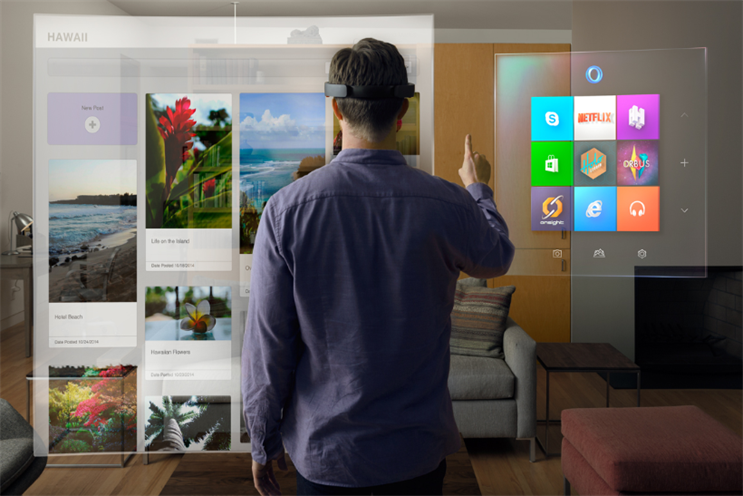
HoloLens is a standalone headset that shows hologrammatic images blended into the real environment.
It is equipped with its own sensors and chips, meaning the wearer does not need to plug the device into a PC and can move about freely.
Unlike the Oculus Rift, which offers full virtual reality and requires a PC, the HoloLens displays holograms laid over the actual environment.
And unlike Google Glass, HoloLens allows users to interact with virtual objects.
HoloLens is designed to show off the capabilities of Microsoft's new Windows 10 operating system, and ultimately, the company's future vision of computing.
In its demo video, Microsoft shows users interacting with documents, playing Minecraft, and giving tutorials using the headset.
According to Forrester analyst James McQuivey, a shift from traditional computing ultimately has large implications for brands. McQuivey predicted that 'mixed-reality' computing would catch on within the decade, with competing devices from Apple and Google.
He said: "If successful, HoloLens will ultimately expand the way people interact with machines just as the mouse-based interface did in the 1990s, and touch interfaces did after the introduction of the iPhone in 2007.
"HoloLens will expand the way brands interact with consumers forever more, working its way through industry after industry much the way Web and mobile experiences did before it."
Windows 10, unlike its predecessors, won't be limited to devices such as a PC, phone or tablet, but will form part of the real environment. To that end, Microsoft is trying to encourage Windows 10 developers to create their own "holographic experiences" through its APIs.
Microsoft hasn't given any further details on the headset, saying only that it will be available "within the Windows 10 lifecycle". Given Windows XP had a lifecycle of 12 years, it's possible the HoloLens won't appear for another decade.
Wisely, it seems Microsoft won't be following Google's lead with Glass and putting its prototype out in the wild. Earlier this month from shelves in a bid to work out how to develop the headset further.
Early HoloLens reviews suggest the device is advanced, with the camera technology outstripping the already impressive capabilities of Microsoft's Kinect console.
According to , the HoloLens features the first ever HPU, or holographic processing unit.


.jpg)


.jpg)